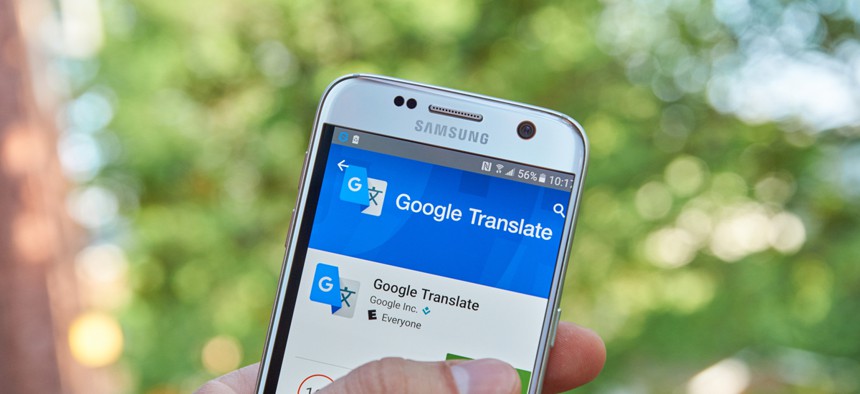A U.S. Court Rejected Google Translate as a Means of Providing Consent to a Cop

dennizn/Shutterstock.com
Courts around the world are increasingly considering relying on machine translation during legal proceedings.
Imagine you’re driving in a foreign country and a police officer stops you on the road. You don’t speak the cop’s language and they don’t speak yours, so a halting exchange ensues using a laptop and Google Translate. You’re not always sure what the officer is asking, and you end up agreeing to something you didn’t quite understand, and are arrested.
That’s what happened to Omar Cruz-Zamora, a Mexican native in the U.S. on a legal visa, in Kansas last September. Based on a typed exchange using Google Translate, he agreed to let police search his car—he wasn’t legally required to—and was arrested for possession of 14 pounds of cocaine and methamphetamines. On June 4, a Kansas court granted Cruz-Zamora’s motion to suppress the evidence, finding Google Translate isn’t good enough for constitutional search purposes.
The Fourth Amendment of the U.S. Constitution prohibits searches and seizures without a warrant. A person who agrees to a warrantless search must provide consent knowingly, freely, and voluntarily. But the Kansas court found the Google Translate’s “literal but nonsensical” interpretations changed the meaning of the officer’s questions, and as a result Cruz-Zamora’s consent to the search couldn’t really have been knowing.
The officer—typing on his laptop in an exchange captured by his in-car camera—asked Cruz-Zamora, “Can I search the car?” But the Spanish translation didn’t ask quite the same question. The decision explains:
Typed into Google Translate, “Can I search the car” translates to “¿Puedo buscar el auto?” When put in reverse order into Google Translate, “¿Puedo buscar el auto?” translates to “Can I find the car.” …while “¿Puedo buscar el auto?” is a literally correct interpretation, it is not the question [the officer] intended to ask defendant.
There were “several other instances in the video where Google Translate provided a literal but nonsensical translation,” the court writes. For example, when the cop asked to see Cruz-Zamora’s driver’s license, he typed the query into Google Translate in English, then showed Cruz-Zamora the results on the laptop screen. Cruz-Zamora responded by quizzically repeating the question as Google had translated it in Spanish, which actually meant “Do you have a driver for the license?”
Cruz-Zamora said he didn’t understand what was being asked nine different times. Most important is what happened right before the search. There’s no video record of what precisely the officer asked; the question he typed into Google Translate wasn’t captured on camera, and the only footage recorded at that moment was the exchange itself. All the court could base its decision on was testimony from both the police officer and Cruz-Zamora about what they’d seen on screen. As such, the court said it was impossible to discern exactly what it was Cruz-Zamora was responding to. The written transcript, based on the video, provides this for example:
Officer: [Background Sound: Typing on Keyboard]
Defendant: Okay…it is in front of the car because I’m going to look for it … How?
Officer: Do you understand?
Defendant: No, how?
Officer: [Background Sound: Typing on Keyboard]
Defendant: Ah, okay. Yeah…yeah. Go. Yes.
After this, the officer searched the car. But the court didn’t consider this a knowing consent.
Professional interpreters testified that Google Translate offers only “literal word-for-word translations” and cannot take context into consideration. “So, while it might be reasonable for an officer to use Google Translate to gather basic information such as the defendant’s name or where the defendant was traveling, the court does not believe it is reasonable to rely on the service to obtain consent to an otherwise illegal search,” the judge writes.
The prosecution, for its part, pointed to a similar case about a bilingual exchange in Texas, also involving Google Translate, where a court found consent to search was voluntary. But the Kansas court noted an important difference: in the Texas case, the officer pointed to his eyes and then to the trunk of the car, and the defendant opened the trunk, indicating an understanding and consent.
The court dismissed the prosecution’s arguments that the Cruz-Zamora’s actions during the search implied consent to the intrusion. It wasn’t clear from the evidence what question was asked or what Cruz-Zamora was agreeing to, according to the judge “and the court will not interpret defendant’s compliance with…instructions to stand by the side of the road during the search as implied consent.”
The decision is especially notable because it comes at a time when courts around the world are increasingly considering relying on machine translation during legal proceedings. For example, in the UK on June 7, the top judge in England and Wales, Ian Burnett, predicted that machine translations will eliminate the need for human linguists in courtrooms, saying, “I have little doubt that within a few years high-quality simultaneous translation will be available and [we’ll] see the end of interpreters.”
Linguists would no doubt differ with the UK judge on this. As the Kansas court noted, based on testimony from professional interpreters, there’s a vast difference between spoken language and literal translation.
Context is critical and technology also can’t master slang or local dialects the way humans can. Larry Gould, CEO of language service provider The Big Word, responding to Barnett’s comments in the translation-industry blog Slator, says, “Our experiences have taught us that AI still has a long way to go in being able to deliver the subtleties and nuances of language. At the moment these can be lost very quickly with machine translation, and this could have a big impact on access to justice and law enforcement if it is rushed out too fast.”
'
NEXT STORY: CBP's remote arrivals app to launch nationwide





